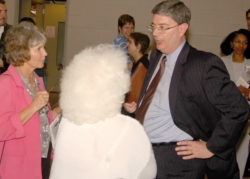Weigel opens local lecture series with talk on Europe’s future
BOSTON -- The leading biographer of Pope John Paul II delivered a lecture Oct. 7 at Harvard Square’s St. Paul Church on “Europe’s civilization crisis and what it means for the rest of us.”
In his opening remarks the first night of the lecture series sponsored by the parishes’ Lay Committee on Contemporary Spiritual and Public Concerns, Cardinal Seán P. O’Malley said he was a great fan of George Weigel’s writings on the late pontiff. “I enjoyed all of them, but none of them moved me as much as you did, George, when you described his ministry as a priest.”
The cardinal, noting it was the feast day of his order, led the audience of hundreds in a robust recitation of The Prayer of St. Francis of Assisi.
Weigel, senior fellow of the Ethics and Public Policy Center in Washington, D.C., said his current thinking about the cultural crisis in Europe is shaped by a visit he made to Paris in 1997, when he took a tour of The Great Arch of de la Defense. The monument was completed in 1989 to celebrate the 200th anniversary of the writing of “The Rights of Man.”
Atop the arch is a huge, sterile, white cube of polished marble. As he stood on the roof of the 42-foot cube admiring the cityscape, he read in the guidebook that the entire structure of Notre Dame Cathedral, including its spires, towers and gargoyles, could fit inside the cube, he said.
This crystallizing moment led him to question which culture would better protect the rights of man, he said. “The one that produced the cube or the one that produced the cathedral that would fit inside?”
For Europe, the question becomes less academic and more practical in the context of the challenges brought by a more assertive Islam, he said.
Europe has four possible outcomes, he said. It could continue its current course dealing with everything from its spiritual malaise to its shrinking base of taxpaying workers and survive. It could muddle through with some countries as functioning democracies and others becoming Islamic states. It could revert to its Christian roots and values that made it the wealthiest and most tolerant part of the world, he said.
The fourth option, is the coming of “Eurabia,” he said. In this scenario, reversing its retreat 300 years ago, Islam would sweep over the European continent, and like Hagia Sophia -- the former Cathedral of Constantinople now converted to a mosque ? Notre Dame Cathedral would become a museum in the heart of a Muslim land, he said.
Weigel did not speculate on which outcome he thought was more likely though he said it was doubtful that Europe would make a strong return to its Christian roots.
America, he said, could face similar circumstances if society here, as in Europe, does not hold on to its Christian identity.
After his talk, Weigel answered questions from the pews, written on index cards and passed forward. When he was asked how he could reconcile the Church’s history of supporting authoritarian governments with his contention that the Church fostered the separation of church and state and the rights of the individual, he said, “There is a little book in the back called ‘The Cube and the Cathedral.’”
“What a tour de force,” said Jerome D. Maryon, the president of the committee that sponsored the event, after Weigel had finished.
Maryon said this lecture series’ second season and the next presentation will feature David Hall, author of “The Spiritual Revitilization of the Legal Profession: A Search for Sacred Rivers.” Hall, a professor of law at Northeastern University, will speak Oct. 20 beginning at 7:30 p.m.



















